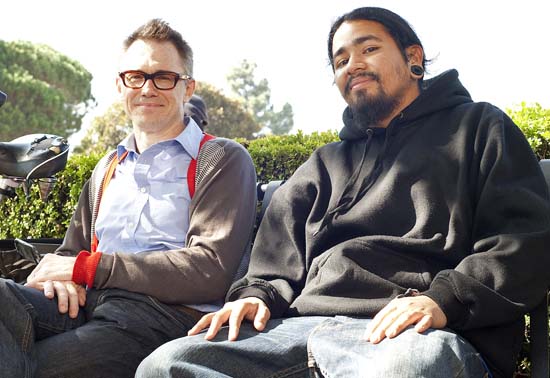Commuters make it to class without a car

Brian Walker (left), a professor of political science, and Jose Hernandez, a fourth-year Latin American studies student, commute to UCLA everyday without a car. Walker bikes to campus, while Hernandez uses the Metro train and the Culvery City bus system.
By Melissa Joffe
Oct. 18, 2009 10:54 p.m.
Soaring rents have kept Jose Hernandez from living in Westwood the entirety of his four years at UCLA.
Hernandez, a fourth-year Latin American studies student, is from Northern California, but he chose to live in Lynwood this year because at $400 a month, it was the cheapest rent he could find for his own room.
Hernandez said he tries to crash at friends’ places near UCLA as much as he can, but when he has to go home to Lynwood, he faces a grueling two hour and 15 minute commute back to school in the morning.
On Tuesdays and Thursdays, Hernandez begins his commute at 6 a.m. with a twenty-minute walk to the train stop for the Metro Green Line, which travels from Long Beach to the Aviation Station near the Los Angeles International Airport.
He then picks up the Culver City 6 bus, which goes directly to UCLA. Hernandez arrives at campus just in time to make it to his 8:30 a.m. class. Because he usually rushes out of the house, Hernandez skips breakfast and opts for lunch once he is at school.
On Mondays and Wednesdays, his days start later but also end later. Hernandez usually stays at Powell until it closes at 11 p.m., and then gets back on the bus to finish up his readings for class.
Although Hernandez believes that public transportation can take him anywhere in Los Angeles, he finds the commute difficult due to the immense traffic he encounters along the way.
He said he would like to see more incentives encouraging people to take public transportation.
“There are too many people on the freeways and too many cars with only one person in them,” he said.
Penny Menton, associate director in charge of commuter services, and Dave Karwaski, planning and policy manager of UCLA Transportation Services, work to alleviate transportation issues of students, staff, and professors traveling to UCLA.
UCLA subsidizes public transportation, covering 67 percent of the cost for the Culver City 6 line that Hernandez travels each day, Karwaski said.
“At this point in time, that connection is the basic and best infrastructure is the best that the region has to offer,” he said.
Matthew Kroneberger, president of Bruins for Traffic Relief , advised commuting students to be creative with their transit routes in order to avoid traffic.
Commuting students, he said, should not just rely on what looks like the shortest route, but instead take into consideration common areas of traffic congestion.
Traffic was the reason political science professor Brian Walker sold his car in favor of biking to UCLA from Venice every day.
“I hated Los Angeles when I drove my car and started loving Los Angeles immediately when I got back on my bike and realized that it had just been a stupid experiment to drive for a couple of years,” Walker said.
For Walker, who has been biking consistently for 25 years, Los Angeles is the best city in the world to ride bikes in because of its flat streets, relatively well-behaved motorists and pleasant weather.
He avoids traffic by taking creative routes alongside streets that cars rarely travel on.
“The ride is almost always the best part of my day,” he said.
Walker often rides his bike in coordination with public transportation. He rides the bus in Beverly Hills, where he considers motorists most dangerous. A motorist once opened the car door in front of Walker on Robertson Boulevard in Beverly Hills, throwing him onto the lap of the driver.
He said he thinks that the bus system could be improved only by adding more bicycle racks to buses, and added that Los Angeles could do with more dedicated bicycle lanes and bicycle paths that don’t end in the middle of the street.
“Getting around by car or getting around by foot is really miserable, but biking, especially with the bus system, is a fabulous way of getting around L.A.,” Walker said.
Transportation Services offers reduced rates for public transit, prepaid BruinGo! bus passes, a vanpool service and the Zimride program , which connects people traveling the same commuting route.
“The concept is that there are likely people who live in your area that are commuting to UCLA. You can get into this online application and see people that live in proximity to you, put in your information ““ I go at these days at these times ““ and see if you can get matched up,” Karwaski said.
In order to make commuters aware of the options UCLA offers, commuter services has been building a new infrastructure of social media.
The different types of media include a Transportation Services application on Facebook, the Facebook Zimride application and a “Be a Green Commuter” blog with more information, Minton said.

